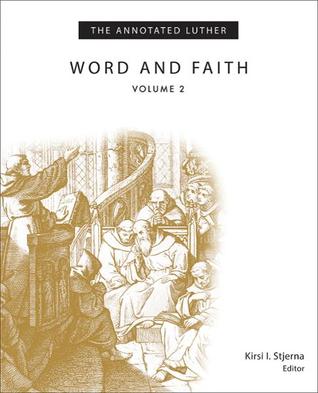- Bible
- Read the Bible
- Bible Versions
- Verse of the Day
- Reading Plans
- Verses by Topic
- Books of the Bible
- Bible Images
- Study
- Commentaries
- Concordances
- Dictionaries
- Encyclopedias
- Sermons
- Bible Atlas & Maps
- BP Wiki
- Devotionals
- Today's Devotionals
- Light of the World
- All Devotionals
- Inspirational Quotes
- More
- Picture Quotes
- Videos
- Inspirational
- Bible Study
- What The Bible Says
- Bible Q&As
- Daily Bread
- Bible by Genre
- Bible Stories
- Random Bible Verse
- Community
- Store
The Annotated Luther, Volume 2: Word and Faith
by Martin Luther
Volume 2 of The Annotated Luther series contains a number of the writings categorized under the theme word and faith. Luther was particularly focused on what the word "does" in order to create and sustain faith. Writings in the volume range from the large core documents Bondage of the Will, Against the Heavenly Prophets, The Smalcald Articles,Bondage of the Will, Against the Heavenly Prophets, The Smalcald Articles, and Large CatechismLarge Catechism to Luther's own Confession of FaithConfession of Faith and treatments of Moses, the Gospels, and Two Kinds of RighteousnessTwo Kinds of Righteousness.
In the treatises in this volume, we hear Luther's understanding of Scripture and theology as he continues his growth as teaching theologian, pastor, biblical exegete, and apologist for the faith.
Each volume in The Annotated Luther series contains new introductions, as well as annotations, illustrations, and notes, to help shed light on Luther's context and interpret his writings for today. The translations of Luther's writings include updates of Luther's Works, American Edition or entirely new translations of Luther's German or Latin writings.
In the treatises in this volume, we hear Luther's understanding of Scripture and theology as he continues his growth as teaching theologian, pastor, biblical exegete, and apologist for the faith.
Each volume in The Annotated Luther series contains new introductions, as well as annotations, illustrations, and notes, to help shed light on Luther's context and interpret his writings for today. The translations of Luther's writings include updates of Luther's Works, American Edition or entirely new translations of Luther's German or Latin writings.
Hardcover, 528 pages
Published September 1st 2015 by Fortress Press
© 2025 Bibleportal.com All rights reserved.

Martin Luther changed the course of Western civilization by initiating the Protestant Reformation. As a priest and theology professor, he confronted indulgence salesmen with his 95 Theses in 1517. Luther strongly disputed their claim that freedom from God's punishment of sin could be purchased with money. His refusal to retract all of his writings at the demand of Pope Leo X in 1520 and the Holy Roman Emperor Charles V at the Diet of Worms meeting in 1521 resulted in his excommunication by the pope and condemnation as an outlaw by the emperor.
Luther taught that salvation is a free gift of God and received only by grace through faith in Jesus as redeemer from sin, not from good works. His theology challenged the authority of the pope of the Roman Catholic Church by teaching that the Bible is the only source of divinely revealed knowledge and opposed sacerdotalism by considering all baptized Christians to be a holy priesthood.
His translation of the Bible into the language of the people (instead of Latin) made it more accessible, causing a tremendous impact on the church and on German culture. It fostered the development of a standard version of the German language, added several principles to the art of translation, and influenced the translation into English of the King James Bible. His hymns inspired the development of singing in churches. His marriage to Katharina von Bora set a model for the practice of clerical marriage, allowing Protestant priests to marry.
... Show more